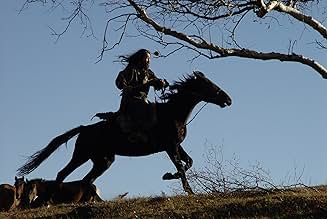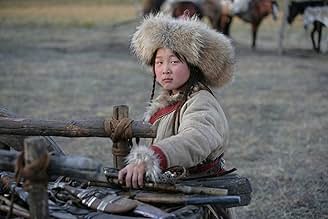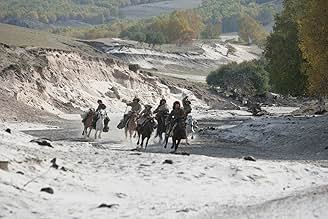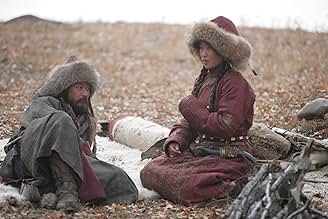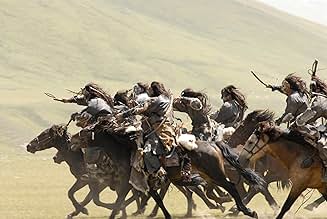IMDb रेटिंग
7.2/10
51 हज़ार
आपकी रेटिंग
कहानी चंगेज खान के शुरुआती जीवन से शुरू होती है जो 1206 में आधी दुनिया को जीतने के लिए निकलने से पहले एक गुलाम था.कहानी चंगेज खान के शुरुआती जीवन से शुरू होती है जो 1206 में आधी दुनिया को जीतने के लिए निकलने से पहले एक गुलाम था.कहानी चंगेज खान के शुरुआती जीवन से शुरू होती है जो 1206 में आधी दुनिया को जीतने के लिए निकलने से पहले एक गुलाम था.
- 1 ऑस्कर के लिए नामांकित
- 16 जीत और कुल 13 नामांकन
Liya Ai
- Oelun - Temudjin's Mother
- (as Aliya)
Baasanjav Mijid
- Esugei - Temudjin's Father
- (as Ba Sen)
Ayuur
- Sorgan-Shira
- (as A You Er)
Huntun Batu
- Altan
- (as Hong Jong Ba Tu)
Deng Ba Te Er
- Daritai
- (as E Er Deng Ba Te Er)
Su Ya La Su Rong
- Girkhai
- (as Su You Le Si Ren)
फ़ीचर्ड समीक्षाएं
The first installment of a prospective trilogy, Mongol chronicles the early life of Temudjin, from his childhood on the Asian steppe to his ascension to Khan in 1206.
The performances are passable with special thanks to Honglei Sun, with an engaging turn as Temudjin's long-time friend and ally Jamukha but the film has a rushed quality to it that is predominantly the fault of the screenplay. We jump too quickly from one scene to the next, the tension is constantly disrupted, and the characters are, for the most part, one-dimensional, void of quirks and personal histories and any of the other qualities that might make them relatable. I'm not asking for anything fancy: theirs was a tribal culture constantly engaged in the act of survival, and any philosophical rants or emotive confessionals would feel forced and inorganic, but none of that pardons the film for the simple crime of not giving its characters enough to do. The needs of the plot seem to dictate their actions, rather than the needs of the characters driving the plot.
The biggest casualty, as always, is the love story. Ironically enough, Temudjin and Borte generate the most chemistry when they meet as children, Borte commanding him with a freeness of spirit that gets less and less visible as the movie progresses to pick her as his bride. Unfortunately, their subsequent romance is more about desperate rescues and long-winded goodbyes than it is the simple moments of intimacy that make a relationship believable.
That said, the cinematography is tremendous and the costumes top-notch, and the casting department deserves a couple extra bushels of brownie points for picking actors who unlike many a Hollywood ensemble look like they could actually survive the conditions they supposedly inhabit. The combat scenes are captivating and cleverly shot, and despite the inevitable comparison to such battle-heavy epics as Lord of the Rings and Gladiator, Bodrov keeps a handle on things, never letting any of the battles run beyond the five minute mark, endowing the film with an element of realism and restraint where many of the other so-called epics go completely over the top. True, the movie relies a bit more heavily on CGI than I would prefer, but the Mongolian landscape, the real star of the show, is so gorgeous, so demanding, so jaw-droppingly authentic that we quickly forget our visual grievances and get lost in the rudimentary act of watching.
A pity we can never lose ourselves completely.
The performances are passable with special thanks to Honglei Sun, with an engaging turn as Temudjin's long-time friend and ally Jamukha but the film has a rushed quality to it that is predominantly the fault of the screenplay. We jump too quickly from one scene to the next, the tension is constantly disrupted, and the characters are, for the most part, one-dimensional, void of quirks and personal histories and any of the other qualities that might make them relatable. I'm not asking for anything fancy: theirs was a tribal culture constantly engaged in the act of survival, and any philosophical rants or emotive confessionals would feel forced and inorganic, but none of that pardons the film for the simple crime of not giving its characters enough to do. The needs of the plot seem to dictate their actions, rather than the needs of the characters driving the plot.
The biggest casualty, as always, is the love story. Ironically enough, Temudjin and Borte generate the most chemistry when they meet as children, Borte commanding him with a freeness of spirit that gets less and less visible as the movie progresses to pick her as his bride. Unfortunately, their subsequent romance is more about desperate rescues and long-winded goodbyes than it is the simple moments of intimacy that make a relationship believable.
That said, the cinematography is tremendous and the costumes top-notch, and the casting department deserves a couple extra bushels of brownie points for picking actors who unlike many a Hollywood ensemble look like they could actually survive the conditions they supposedly inhabit. The combat scenes are captivating and cleverly shot, and despite the inevitable comparison to such battle-heavy epics as Lord of the Rings and Gladiator, Bodrov keeps a handle on things, never letting any of the battles run beyond the five minute mark, endowing the film with an element of realism and restraint where many of the other so-called epics go completely over the top. True, the movie relies a bit more heavily on CGI than I would prefer, but the Mongolian landscape, the real star of the show, is so gorgeous, so demanding, so jaw-droppingly authentic that we quickly forget our visual grievances and get lost in the rudimentary act of watching.
A pity we can never lose ourselves completely.
I saw this last week at the Toronto film festival and loved it. Many of the people in my group did not want to see it because they were not interested in the subject matter and ended up loving the film. It seemed to be the overall favorite of the group (we saw 12 films in Toronto). There is a fair amount of blood so if one is bothered by violence, you may not enjoy it. In some ways it reminded me of Braveheart because you learned about the history, but there was also beautiful cinematography, landscapes, and very well done battle scenes. This film could possibly be in the running for the best foreign film Oscar.
To the above two comments.
You know how they say history was written by the victors? That's true for everyone but the Mongols. Most of their history was written by the Chinese, Russians, Arabs, and other conquered peoples who had an interest in perpetuating Genghis Khan = bloodthirsty savage.
The movie is based on one of the few sources about Genghis khan written in Mongolian. It's called the secret history of the Mongols and was written shortly after he died as a record for the Mongolian royal family. He was just a chieftain's's son of a very minor tribe. That's what makes this story so impressive, he didn't start out as a king or a prince with a huge army, like Alexander. Everything he had, he had to earn. He didn't get to be Genghis Khan until he was in his 30's. He was always aware of how victory wasn't assured but had to be paid for with planning and strategy. He wasn't a saint by any means but he wasn't an unthinking savage. This movie is actually meant to be the first in a trilogy with the second one probably detailing his conquest of north china and the third the conquest of the Khwarezim empire in Iran and Afghanistan.
This is an approach that I like because the Alexander movie died on account of it trying to condense all of his conquests into one movie.
You know how they say history was written by the victors? That's true for everyone but the Mongols. Most of their history was written by the Chinese, Russians, Arabs, and other conquered peoples who had an interest in perpetuating Genghis Khan = bloodthirsty savage.
The movie is based on one of the few sources about Genghis khan written in Mongolian. It's called the secret history of the Mongols and was written shortly after he died as a record for the Mongolian royal family. He was just a chieftain's's son of a very minor tribe. That's what makes this story so impressive, he didn't start out as a king or a prince with a huge army, like Alexander. Everything he had, he had to earn. He didn't get to be Genghis Khan until he was in his 30's. He was always aware of how victory wasn't assured but had to be paid for with planning and strategy. He wasn't a saint by any means but he wasn't an unthinking savage. This movie is actually meant to be the first in a trilogy with the second one probably detailing his conquest of north china and the third the conquest of the Khwarezim empire in Iran and Afghanistan.
This is an approach that I like because the Alexander movie died on account of it trying to condense all of his conquests into one movie.
While the plot contained some dubious twists and had rather strange and slow pacing, the overall effect of this movie is stellar. The cinematography rivals, while being similar to, movies such as "Crouching Tiger, Hidden Dragon". The score was amazing. The acting was, to my English speaking eyes and ears, convincing. The few combat scenes were filmed and choreographed to great effect. I am not sure how historically accurate this movie is, but it works as an enchanting piece of cinema. Highly recommended to anyone who likes art films and historical epics. Seriously, the locations make me want to take a vacation to the steppes immediately.
Astonishingly, the name and the person of Genghis Khan in Sergei Bodrov's "Mongol," a great, Shakespearean drama about this seminal figure in history, don't appear until the very end of the two-hour epic. Instead, we see Temudjin, the man yet to become (posthumously) Khagan (emperor) of what was to be for several centuries the largest contiguous empire in history. Whether Bodrov completes the contemplated two additional chapters of the story or not, "Mongol" stands on its own as a masterpiece.
Contradicting the Western (and Russian) image of Genghis as the monstrous conqueror, Bodrov's work is influenced by Lev Gumilev's "The Legend of the Black Arrow" and is based on "The Secret History of the Mongols," the 13th century Mongolian account, unknown until its re-emergence in China 700 years later. For a director, who learned in school only about the horrors of Russia's 200-year subjugation by the Mongols, taking a "larger view" is a remarkable act.
Unlike Omar Sharif in the 1965 Henry Levin "Genghis Khan" or Takashi Sorimachi in Shinichiro Sawai's disappointing 2007 "To the Ends of the Earth and Sea," Tadanobu Asano in Bodrov's film is strictly Temudjin, not the great Khan. He lived from 1162 to 1227, and "Mongol" covers the years between 1171 and the beginning of the unification of Mongolian tribes around the turn of the century.
In fact, the spookily powerful child Temudjin (Odnyam Odsuren) dominates the first part of the film, undergoing trials and tribulations that make the lives of Dickens' abused and imperiled children look like a picnic. From age nine into his 30s, Temudjin was orphaned, hunted, imprisoned, enslaved, and constantly threatened by extinction. Literally alone in the vast landscape (brilliantly photographed by Rogier Stoffers and Sergei Trofimov), Temudjin escapes death repeatedly, at times almost mysteriously.
"Mongol" is huge - with endless vistas and epic crowd scenes, quite without special effects - but Bodrov keeps the setting just that, never strutting visuals for their own sake. The film is about people, and the cast is magnificent. Asano's face and eyes hold attention, and make the viewer experience simultaneous feelings of getting to know the character he plays and being held at arm's length. Bodrov and Asano escape all the many Hollywood pitfalls in making an epic - they present nothing easy, predictable, trite. The term "Shakespearean" is used here advisedly.
The Mongolian actors are sensational: Khulan Chuluun is luminous as Borte, Temudjin's wife; Borte's 10-year-old self, the girl who chooses Temudjin, then 9, while he thinks he is the one making the decision, is unforgettable, even if the name is hard to remember: Bayertsetseg Erdenebat.
Chinese actors are vital to the film. As Temudjin's father (poisoned by Tatars before the boy reached 10), Sai Xing Ga makes an impression few actors can achieve in such a brief appearance. Nearly overshadowing Asano is the grand thespian exercise from Sun Hong-Lei, as Temudjin's all-important blood brother Jamukha. Sun is almost too big for the big screen, perhaps a less intense performance would have served the film better.
Another problem is near the end of "Mongol," with Borte's stranger-than-fiction (and actually fictional) rescue of Temudjin from a Tangut prison, years, hundreds of miles, and impossible alliances and dalliances telescoped into a few near-incongruous minutes - all to cover a 10-year-long gap in Genghis' history. Except for that, however, Bodrov's work is engrossing, spectacular, and memorable.
Contradicting the Western (and Russian) image of Genghis as the monstrous conqueror, Bodrov's work is influenced by Lev Gumilev's "The Legend of the Black Arrow" and is based on "The Secret History of the Mongols," the 13th century Mongolian account, unknown until its re-emergence in China 700 years later. For a director, who learned in school only about the horrors of Russia's 200-year subjugation by the Mongols, taking a "larger view" is a remarkable act.
Unlike Omar Sharif in the 1965 Henry Levin "Genghis Khan" or Takashi Sorimachi in Shinichiro Sawai's disappointing 2007 "To the Ends of the Earth and Sea," Tadanobu Asano in Bodrov's film is strictly Temudjin, not the great Khan. He lived from 1162 to 1227, and "Mongol" covers the years between 1171 and the beginning of the unification of Mongolian tribes around the turn of the century.
In fact, the spookily powerful child Temudjin (Odnyam Odsuren) dominates the first part of the film, undergoing trials and tribulations that make the lives of Dickens' abused and imperiled children look like a picnic. From age nine into his 30s, Temudjin was orphaned, hunted, imprisoned, enslaved, and constantly threatened by extinction. Literally alone in the vast landscape (brilliantly photographed by Rogier Stoffers and Sergei Trofimov), Temudjin escapes death repeatedly, at times almost mysteriously.
"Mongol" is huge - with endless vistas and epic crowd scenes, quite without special effects - but Bodrov keeps the setting just that, never strutting visuals for their own sake. The film is about people, and the cast is magnificent. Asano's face and eyes hold attention, and make the viewer experience simultaneous feelings of getting to know the character he plays and being held at arm's length. Bodrov and Asano escape all the many Hollywood pitfalls in making an epic - they present nothing easy, predictable, trite. The term "Shakespearean" is used here advisedly.
The Mongolian actors are sensational: Khulan Chuluun is luminous as Borte, Temudjin's wife; Borte's 10-year-old self, the girl who chooses Temudjin, then 9, while he thinks he is the one making the decision, is unforgettable, even if the name is hard to remember: Bayertsetseg Erdenebat.
Chinese actors are vital to the film. As Temudjin's father (poisoned by Tatars before the boy reached 10), Sai Xing Ga makes an impression few actors can achieve in such a brief appearance. Nearly overshadowing Asano is the grand thespian exercise from Sun Hong-Lei, as Temudjin's all-important blood brother Jamukha. Sun is almost too big for the big screen, perhaps a less intense performance would have served the film better.
Another problem is near the end of "Mongol," with Borte's stranger-than-fiction (and actually fictional) rescue of Temudjin from a Tangut prison, years, hundreds of miles, and impossible alliances and dalliances telescoped into a few near-incongruous minutes - all to cover a 10-year-long gap in Genghis' history. Except for that, however, Bodrov's work is engrossing, spectacular, and memorable.
क्या आपको पता है
- ट्रिवियाDirector Sergei Bodrov and Production Designer Dashi Namdakov visited Mongolia's chief shaman in the capital city of Ulan Bator, so that they could ask permission to film a movie about Genghis Khan's life. The shaman told them that of all the people who have talked about making such a film, they were the only ones to ask his permission.
- गूफ़The Mongolian tribes, including the hordes that conquered their vast empire, rode on a very peculiar race of horses, stocky build, with relatively short legs and a large head. The horses used in the movie look like ordinary western horses
- कनेक्शनFeatured in The 80th Annual Academy Awards (2008)
- साउंडट्रैकBeginning
Composed By Tuomas Kantelinen
Performed by Hamburg Film Orchestra, The London Session Orchestra, One Orchestra, Altan Urag
© 2008 X-Filme Creative Pool GmbH.
(p) 2008 Kinofabrika GmbH & Tuomas Kantelinen Ensemble.
टॉप पसंद
रेटिंग देने के लिए साइन-इन करें और वैयक्तिकृत सुझावों के लिए वॉचलिस्ट करें
विवरण
- रिलीज़ की तारीख़
- कंट्री ऑफ़ ओरिजिन
- भाषाएं
- इस रूप में भी जाना जाता है
- Mongol: The Rise of Genghis Khan
- फ़िल्माने की जगहें
- Inner Mongolia, चीन(location)
- उत्पादन कंपनियां
- IMDbPro पर और कंपनी क्रेडिट देखें
बॉक्स ऑफ़िस
- बजट
- $1,80,00,000(अनुमानित)
- US और कनाडा में सकल
- $57,05,761
- US और कनाडा में पहले सप्ताह में कुल कमाई
- $1,35,326
- 8 जून 2008
- दुनिया भर में सकल
- $2,65,27,510
- चलने की अवधि
- 2 घं 6 मि(126 min)
- रंग
- ध्वनि मिश्रण
- पक्ष अनुपात
- 2.35 : 1
इस पेज में योगदान दें
किसी बदलाव का सुझाव दें या अनुपलब्ध कॉन्टेंट जोड़ें







